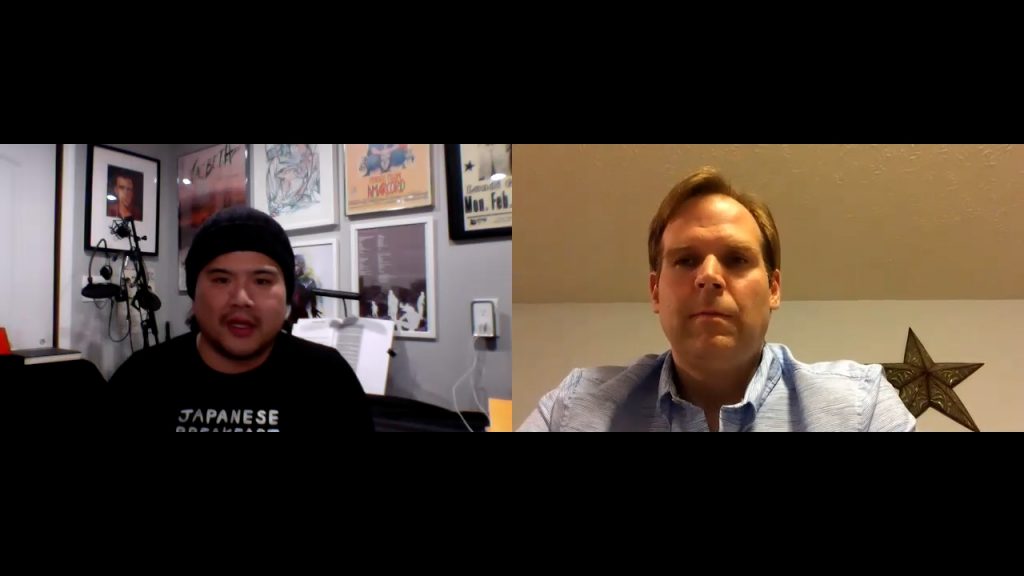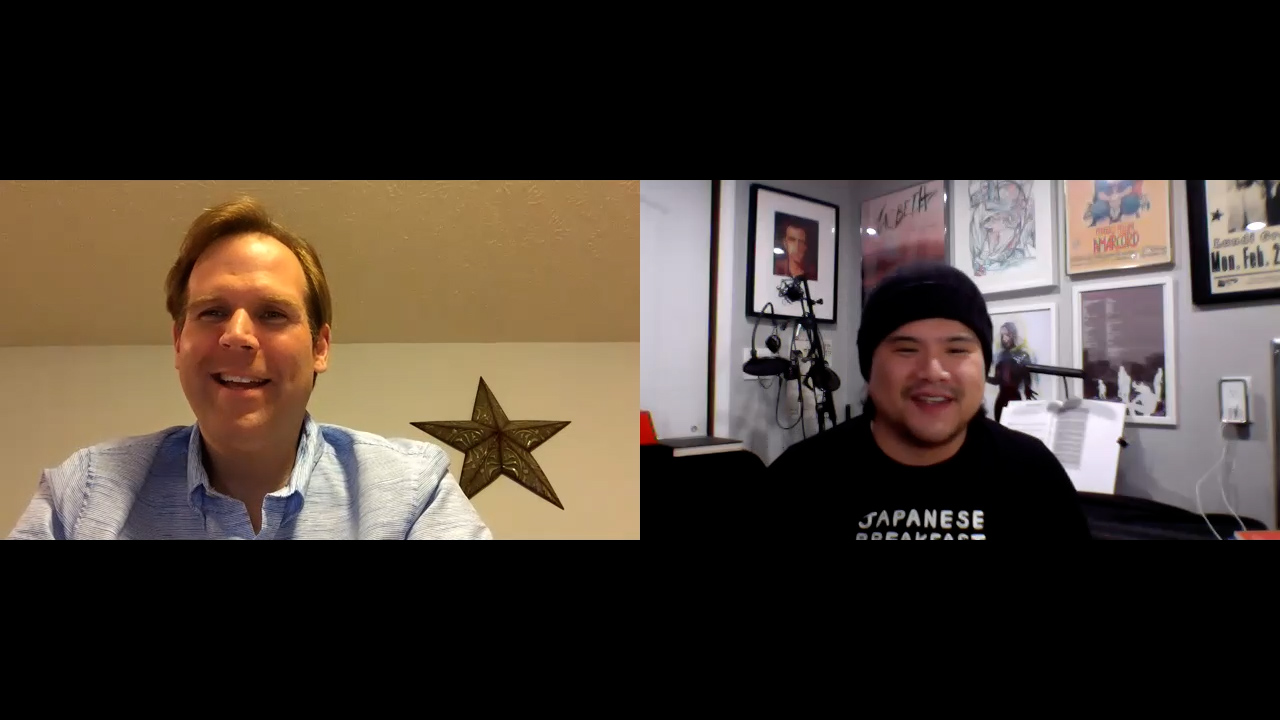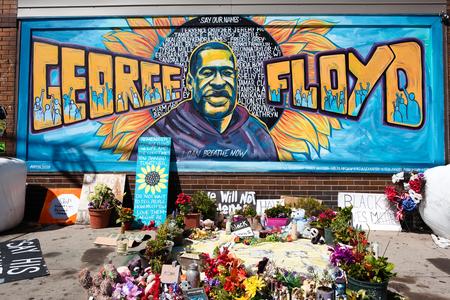AAPI Stories: “It Was a Reckoning for Us”
Jon Eaton and Chien-An Yuan are longtime friends who grew up together in suburban Ohio. While they could talk about anything — and nothing — for hours, it wasn’t until the past year their conversations went deeper.

This month, WDET is amplifying the diverse stories of our local Asian American and Pacific Islander community, sharing the joys and struggles of being Asian American in Southeast Michigan. In collaboration with Detroit Public TV, we invited several community members to share their personal stories.
Tune into this week’s episode of One Detroit on Detroit Public TV / WTVS 56 at 7:30 p.m. on Thursday for a recap of the May 19 Virtual Town Hall – How We Got Here: The Asian American Experience in Metro Detroit.
Chien-An Yuan and Jon Eaton grew up together in Bay Village, Ohio, and could spend hours talking to each other about music, pop culture and movies (for example this conversation itself, which was peppered throughout with entertainment references ranging from Michelle Pfeiffer in “Dangerous Minds” to “Curb Your Enthusiasm.”). It wasn’t until the murder of George Floyd last year that the pair really started to delve deeper into conversations. Chien-An, who lives in Ann Arbor and is Taiwanese and Chinese American, and Jon, who lives in Ohio, recently chatted over Zoom to talk about how they started to connect on a different level after 30 years of friendship and reflect on their shared and divergent experiences growing up in the homogenous suburb of Bay Village.
Click the audio player above to listen to Chien-An and Jon’s conversation, and read below for excerpts, edited for clarity and brevity.
Chien-An: It definitely was weird because there was just so much to digest, right? Everything was moving so quickly that … it was pretty therapeutic for us to connect and talk about what was happening just with COVID; from the onset … there were so many facts lying around, so much news happening. And then when George Floyd happened, I think it was one of those moments where it was difficult for both of us to process because, I think, for the first time, there was a moment where the entire world had stopped. I think for anyone who lives in this country, it was a reckoning for us for how to understand … how we were raised to believe the police functions, and have that come into conflict with the obvious history of systemic racism that has happened that is prevalent in so much of law enforcement. And that was difficult [for me] to process. Coming from a family where my grandfather was a chief of police in Taiwan … I was always raised to hold the police in high regard. But over the years, obviously, just growing up as a person of color in the United States … I think that’s where our conversation started to really shift. I’ve had to reckon with this as a person of color, just to understand that things are very troubled. The history of this country is very troubling to confront that history. It’s hard for anybody, and then for us to start talking about it that night [of our phone call after George Floyd was killed] it’s like, anger, confusion, we went through all the stages.
Jon: I think you also helped me sort of translate it …[the] news … or like an event, or really like a tragic one … And how someone I knew, that I didn’t even really process how they could, but how you would view that and how it could impact you differently than me. And I think you shed a lot of light on that.
Shared and Divergent Experiences in Bay Village

Chien-An: … We have never really talked about what it was like for me, growing up in Bay.
Jon: We sort of floated [among groups of friends], growing up … so Bay, you know, really homogeneous suburb, Bay Village. And we grew up sort of floating between some people in our group of friends were more academics, some theater, some sports, music, the whole nine yards. And I think we met hanging out after school at the library as I recall.
Chien-An: At school, I felt so much as “the other,” especially in middle school, because … I didn’t talk about it with my parents, I didn’t really talk about with anyone, not even my brother; it’s like we never even talked about it ’til later. Because when you’re going through it, it’s hard to see what it is. But hanging out at the library was one of the first places where just hanging out with you and Len I could just be myself and really not be concerned about how I was seen or feel like there was a spotlight on me. Just walking around the halls … people would point me out and or just say not overtly racist stuff, but what people call now “microaggressions.” You just hear some comments. It would be like an all-day thing. And all you want to do is to get through.
Listen: Chien-An and Jon reflect on 30 years of friendship.
Jon: I remember a teacher that consistently called you Chine.
Chien-An: My choir teacher weaponized my name pronunciation, because if I was not paying attention, she would intentionally mispronounce my name, and she knew it drove me nuts. I had been in her class for almost the whole year. And then she was like, “Chine, I need you to be quiet.” You know, in that moment, I’m sure she’s forgotten. I’m sure she forgot. But I remember. I’ll always remember. But, I told you on the first day of school in Mr. Corrigan’s class, the sixth grade, when I sat down, I won’t name names, but you know one of our classmates asked me if I knew how to use a fork.
“You also helped me … [understand] how you would view [George Floyd’s murder] and how it could impact you differently than me. And I think you shed a lot of light on that.” –Jon Eaton, talking to his friend Chien-An Yuan

Jon: That seems like something that would be in a sitcom. Like, stereotypical, fictional world.
Chien-An: Yeah, yeah. No, no first day of school, first day of school. And she was just like, “Where are you from?” And she’s like, “Do you know how to use a fork?” And I can even I can hear her now asking me and the tone of her voice. But in terms of as a microaggression … she really was asking. And for me, it was an epiphany. When I was like, “What’s a microaggression?” I looked it up. I was like, “That’s what you call it.” Because it’s not an overt act of racism. It’s not hate speech, it’s not coming from a place of like, denying you as a human being. It’s this whole other thing, … it was so lovely to have such a relief to finally have a have a word that I can use to describe those experiences. Because if I’m going into the office just to get a pass because I had a bloody nose, and the person leans over the counter just starts petting my hair. I mean, when you’re 12, you’re like, I don’t know what to do with this moment right now. I just know it’s very weird. It’s very confusing. I feel like there’s been a violation of boundaries, but I would never even say that at 12 or 13, this is a violation of boundaries, you’re just like, it’s very awkward, you just kind of leave the office, that’s as much as I could process it at that time. But you know, multiply that by 100.
‘A Real Eye-Opener’

Chien-An: Once I moved to Ohio is when I when I first encountered actual, full-blown racism. Growing up in Ann Arbor, it was that the first time, or the most overt time, was the first time I was actually on a bus. Some friends from Ann Arbor that I went to elementary school with were visiting, and my brother and our friends were on this bus. And we took it downtown. … Two kids got on and they were both white. And so we’re on the bus. And as the kids are getting up, this one kid got up, he like turned around and said, “Get off the ——- bus, you …” And that’s the first time my whole life. And I was 11. And I was angry. The thing that sticks with me was his friend’s face. Because his friend sat there, the kid who said racist verbal attack got off the bus quickly …. So he leaves his friend there and his friend is, I’ll never forget the expression on his face because he was embarrassed. And I’ve always wondered what the rest of his day was like, because the racist is a racist, but I hope that moment was a learning experience for his friend that it’s like, if you’re there, you’re a part of it.
Jon: But I think that like how long we’ve known each other and this stuff has never really come up. In some ways that’s positive because we just hang out have a good time talking about a whole myriad of things, but haven’t had to discuss this. But the fact that this came up now it was again, it was really enlightening. Just to get your perspective, I really didn’t know. I’m kind of ashamed to say I didn’t know.
Chien-An: Yeah, but I think like sharing pain and trauma doesn’t come naturally. And I don’t feel like this is, guys are, you know, we don’t share pain and trauma …
Built on Years of Dialogue and Trust

Jon: Us talking through this stuff and really getting into [it] a lot deeper, so over the last year, it’s really given me like a really important viewpoint from someone that I 100% can trust. And that’s been a real eye-opener. I mean, if I hadn’t known you, I don’t know that I would have known these stories. You know what I mean? Even my buddies from college, we didn’t have these kinds of discussions and as in depth, but we knew each other well … And it’s really, it’s been a huge eye opener, but to know you probably has helped me digest it better and relate to it more.
Chien-An: I feel lucky. I do, and not just because I think anyone who is in their mid-40s is still friends with good friends with from high school should feel, but it really is like a breathing space. I never would have told you guys that. I don’t think I could have verbalized it that way. But I think just to be able to hang out and just be myself — to your guys’ detriment sometimes (laughs). That’s huge, because I was just so confused and angry and bewildered by the experience of growing up there. So the fact that we can, that I can share this stuff, honestly, that’s just built on years of dialogue and trust.
Trusted, accurate, up-to-date
WDET is here to keep you informed on essential information, news and resources related to COVID-19.
This is a stressful, insecure time for many. So it’s more important than ever for you, our listeners and readers, who are able to donate to keep supporting WDET’s mission. Please make a gift today.

